The Master of Computer Applications (MCA) degree is a postgraduate program that equips students with the theoretical knowledge and practical skills needed to excel in the dynamic field of Information technology (IT). But how is the MCA program keeping pace with the ever-changing tech landscape?
As technology continues to revolutionize every aspect of our lives, it’s no surprise that it’s significantly impacting MCA course as well. In 2024, we’re seeing a surge in technology-driven advancements that are transforming the way MCA programs are taught and learned.
Explore how technology is reshaping MCA education
Virtual Reality (VR): Revolutionizing Immersive Learning
- Immersive Learning Environments:
VR transcends traditional textbooks and slides by immersing students in lifelike scenarios. Whether exploring historical sites, dissecting complex algorithms, or visualizing architectural designs, VR provides a unique learning experience. Imagine an MCA student studying database management systems. Instead of merely reading about normalization, they can step into a virtual database room, interact with tables, and optimize schema designs.
- Hands-On Experiences:
VR offers a safe space for hands-on practice, allowing students to experiment without real-world consequences. For instance, an MCA student interested in cybersecurity can simulate network attacks, analyze vulnerabilities, and devise countermeasures within a virtual network environment.
- Collaborative Learning:
VR transcends physical boundaries, enabling students from different parts of the world to collaborate in shared virtual spaces. In a VR classroom, MCA students can work together on coding challenges, debug programs, and discuss algorithms as if they were sitting side by side.
- Complex Problem Solving:
MCA education often involves solving intricate problems, and VR enhances critical thinking skills. Picture an MCA student troubleshooting a distributed system—they can visualize nodes, trace communication paths, and debug issues in a 3D representation.
- Simulated Labs:
Traditional labs have limitations such as limited equipment, safety concerns, and time constraints. VR labs eliminate these barriers, allowing students to practice configuring routers, deploying cloud services, or experimenting with machine learning models—all in a virtual environment.
- Career Readiness:
Employers value practical skills, and VR experiences prepare MCA graduates for real-world challenges. Whether it’s coding, system administration, or data visualization, VR bridges the gap between theory and application.
Artificial Intelligence (AI): Transforming Education
- Intelligent Tutoring Systems:
Powered by AI, intelligent tutoring systems adapt to individual learning needs, providing personalized guidance, feedback, and support to enhance the learning experience. AI analyzes student performance data, tailoring learning paths to maximize potential.
- Microlearning Apps and Adaptive Learning:
Microlearning apps break down complex subjects into bite-sized lessons, while adaptive learning tailors content based on individual needs, ensuring customized pathways to success.
- Online PhD Programs and Flexible Learning:
Universities now offer online master’s and PhD programs, providing flexibility for career professionals. MCA students can pursue advanced education without pausing their careers.
- Emerging Elective Topics:
MCA curricula now include data analytics, robotics, blockchain, IoT, ethical hacking, and more. These topics align with industry demands and individual interests.
Microlearning Apps and Adaptive Learning:
- Microlearning Apps:
These apps simplify complex subjects by breaking them down into bite-sized lessons, focusing on short, targeted modules instead of overwhelming students with lengthy content. For MCA students, this means easily digestible chunks of information that can be absorbed during brief study sessions.
- Adaptive Learning:
Adaptive learning platforms leverage data analytics and AI to customize the learning experience. These systems adjust the difficulty level, content, and pace of learning based on individual needs. If a student struggles with a particular topic, the system provides additional resources or practice exercises. MCA students benefit from tailored learning paths that address their unique strengths and challenges.
Online PhD Programs and Flexible Learning:
Online PhD Programs:
Universities recognize the need for advanced education without disrupting careers. Online master’s and PhD programs enable MCA professionals to pursue higher degrees while continuing to work. These programs offer flexibility, asynchronous learning, and access to expert faculty from anywhere in the world.
Benefits for MCA Students:
- No need to relocate or attend physical classes.
- Balance work, family, and education.
- Collaborate with peers globally.
- Access research resources remotely.
Emerging elective topics:
- The MCA curriculum now includes exciting areas such as:
- Data analytics: understanding and extracting insights from large datasets.
- Robotics: Exploring automation, machine learning, and robotics applications.
- Blockchain: studying decentralised ledgers and smart contracts.
- IoT (Internet of Things): connecting devices and analysing sensor data.
- Ethical Hacking: Learning cybersecurity techniques.
Conclusion:
As the MCA program continues to evolve with technological advancements, its potential to shape future IT leaders remains immense. By integrating these innovations, MCA institutions can cultivate a dynamic learning environment that promotes innovation, critical thinking, and industry-ready skill sets. This approach prepares graduates to hit the ground running and make a significant impact in the ever-changing technology landscape.




